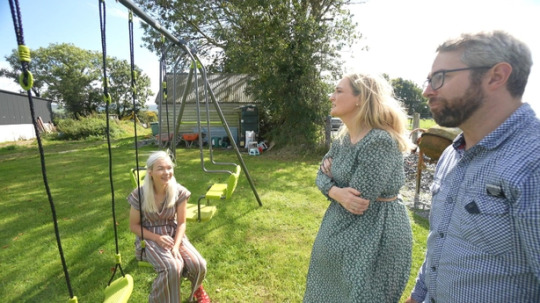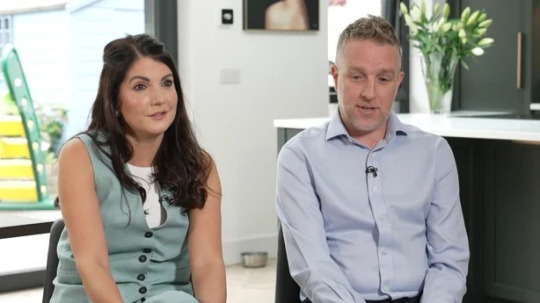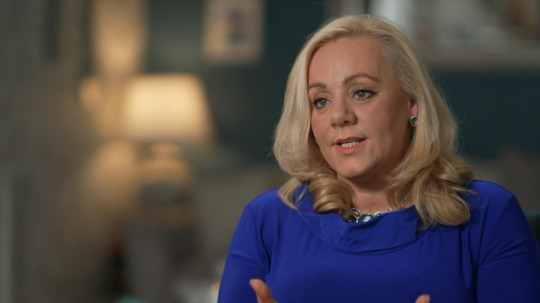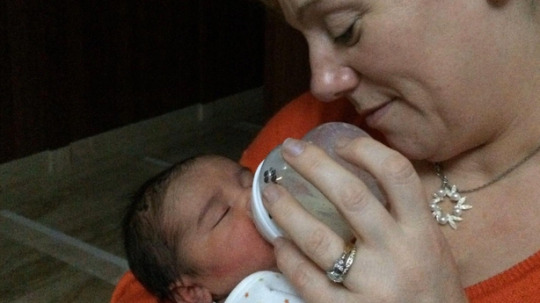#And how she's recovering from pregnancy and childbirth in a warzone
Explore tagged Tumblr posts
Text
"Like many people who go through surrogacy, Cathy said it was not a choice; it was their only option." While I feel bad for what Cathy went through surrogacy was NOT her only option. Adoption is also possible.
By Kate McDonald
As a bill that seeks to regulate aspects of surrogacy goes before cabinet, Prime Time spoke to families who have used international surrogates.
"My house was silent. When you have a stillborn baby, your house is silent." Cathy Wheatley was seven months pregnant when she had a spontaneous uterine rupture. Her daughter, who she named Helen, died at birth and Cathy found out she could not carry any more pregnancies. "I lost my little girl," Cathy said. Despite their devastating loss, Cathy and her husband Keith Wheatley, from Co Wicklow, were determined to have their family.
Like many people who go through surrogacy, Cathy said it was not a choice; it was their only option."When a doctor mentions surrogacy, your first reaction is, people like me don't do that. You know what I mean? Like, we're just ordinary, everyday people on a farm in Wicklow. "But when they looked into it, they found that there were Irish couples doing it.
"You have to be very careful to make sure that you do all your research so that you know that you're doing the best that you possibly can for your babies, but also for your surrogate, because without your surrogate, you wouldn't have your babies," Cathy said.
The Wheatleys decided to go to a clinic in Ukraine, where they met Ivanna, who would eventually carry and give birth to their twins Ted and Elsie.
"It's the biggest thing in the world to give your babies to somebody to carry and to mind until they can give them back to you," Cathy said.
"I love those kids but I don't love them as my own; those are different feelings. Like it’s my nephew or cousins, not like my son or my daughter," Ivanna said.
Ivanna told Prime Time she became a surrogate mother after the birth of her second son.
"That is something I wanted to do because I love helping people, I love the feeling of being pregnant and I thought why, why don’t I help?" Ivanna said.
Cathy and Keith Wheatley remortgaged their house to front the cost. They paid just under €40,000 to their clinic in Ukraine, of which €14,000 was compensation for their surrogate Ivanna.
"I’m pregnant for nine months. I don’t work. But I have two kids. And my kids have basic needs" Ivanna said.
"They needed food, they needed education, they need dresses – everything that a normal kid needs. If I am surrogate, I am pregnant, I can’t work. It’s not like you are getting a lot of money with that - not like you decide 'I need money’ so I’ll go and get a baby for somebody. [It’s] not like many people think it is."
With legal fees, flights and accommodation, their total spend was €70,000.
"They don’t pay you for being pregnant in Ukraine, they compensate for your time," Ivanna said.
The Wheatleys and Ivanna developed a deep relationship and kept in touch after the twins’ birth.
When Russia invaded Ukraine two years ago, the Wheatleys brought Ivanna and her children to live with them in Ireland.
"If we talk about what happened in my country now, they came and they saved my life and they saved the life of my kids because four years ago I gave life to their kids," Ivanna said.

Brian and Kathy Egan had always planned to have four children. But after having her first son, Harry, Kathy had six miscarriages and she said she knew a larger family wasn't to be.
"It obviously gets harder every time to pick yourself up after it and try again. But we still felt very strongly that we'd be able to do this."
Kathy had no issue getting pregnant but couldn’t sustain the pregnancies. After another two miscarriages, the Egans began to consider surrogacy.
"Because it's new to you, you're second-guessing everything, you really want to make sure you have the right information. It's going to be the right clinic, the right surrogate, and everything is right in every way," Brian said.

Kathy and Brian Egan
The cost of surrogacy in the US and Canada ruled that region out for them, so they began looking elsewhere. They decided to go with a clinic in Lviv, Ukraine.
"Within a month, we were matched with a surrogate who matched my blood type, and we went ahead. But unfortunately, at the 20-week scan, we discovered there was a fatal fetal abnormality within the heart."
That first surrogate pregnancy ended in miscarriage, but the Egans then found a second surrogate.
"We did Zoom or Skype calls with Mariana, our surrogate. Her first response after every checkup was, 'now, can we tell Kathy & Brian?'"
"She's a very strong lady and quite business-like too. She was in no doubt that this was helping us both," Brian said.
Baby Luke arrived in May 2019 while Brian, Kathy and big brother Harry were at home in Kilkenny. They travelled through the night to get to Lviv.
"You cannot get there quick enough. You'd swim there," Kathy said.
"He was tiny. He was four weeks early, but he looked like Harry looked when he was born. So, I knew straight away which one to walk over to."
"You feel like, you know, you've been talking to him for months and praying and hoping to meet him, but it's like no other feeling," Kathy said.
The entire process cost the Egans about €100,000, they said.
Two years later, in June 2021, the family were stunned when Brian was diagnosed with an aggressive form of prostate cancer.
"I didn't know what to say, really. That ‘cancer’ word anyway, you're all over the place," Brian said.
Eleven days after he was diagnosed, Brian’s prostate was removed. The surgery was a success, but his next blood test indicated the cancer had spread.
"At that stage I genuinely felt I didn't have long left. I was looking at Luke, he was two, didn't know if he was going, I was going to see him being three."
Brian received radiotherapy treatment and is still getting hormone treatment, which he says is going well.
However, due to the lack of regulation around the legal status for parents of children born through surrogacy, the Egans were left in a precarious situation.
Current Irish legislation does not cover legal issues that arise in surrogacy. The legal status and rights of all people involved are covered by the laws dealing with non-surrogate births.
This means the surrogate mother, who gives birth to the child, is the child's legal mother under Irish law. In the Egan’s case, Kathy is not Luke’s legal parent, although genetically he is her son as he was born using Kathy’s egg and Brian’s sperm.
"We just realised, if I pass away prematurely, Luke is effectively an orphan of the state." said Brian. "Kathy is just his legal guardian. He would not have a parent, he has different rights to Harry."
Brian and Kathy decided to take a case to the High Court, saying the State had failed to recognise Kathy as Luke’s mother.
The Egans were in court in April but have recently paused their action after hearing assurances that long-promised surrogacy legislation will be brought before the Oireachtas soon.
Under proposed terms of the Health (Assisted Human Reproduction) Bill 2022, parents of children born through surrogacy will be recognised as legal parents, if they meet certain criteria in the jurisdiction in which the surrogacy is intended to take place, and also the criteria to be specified in the Irish legislation.
Senator Mary Seery Kearney and her husband Dave tried to have a baby via IVF.
"We did 13 rounds.... I was pregnant on five occasions...unfortunately, they all resulted in a miscarriage," she said.
"We're a very close couple, but it's a very, very stressful experience. All my life... I wanted to be a mother. I wanted my own child," she said.
Mary initially thought that surrogacy was for well-off people: "My view was Elton John did surrogacy, really rich people did surrogacy. We were ordinary people, already indebted from all of the IVFs we had done."
When she began researching, she initially relied on Google. She said the most impressive website she found was for a clinic in Kyiv.
"We flew over, we gave them €12,000 upfront, and nothing came of that," she said.

Senator Mary Seery Kearney
After that experience in Ukraine, Senator Seery Kearney and her husband found a clinic in India and a surrogate who would carry their child.
"We were so grateful to this woman, and I also felt a huge responsibility for her," Mary said.
They said they sent gifts every couple of weeks and engaged with the surrogate mother all the way through. When the pregnancy reached the 20-week mark, they allowed themselves to hope it would be a success.
"I have to say, right up until the moment we stood outside the theatre, I didn't really believe. I believed that something was going to go wrong. Because you, you carry that trauma into the experience," she said.
But when they were called inside they knew it was real.
"I literally ran, I screamed and ran, 'this is my little girl,' handed into my arms," she said.

Now advocating in the Oireachtas for changes to made to Irish surrogacy legislation, Mary thinks 'goodwill' payments should be made to the surrogate to cover their costs during the pregnancy, but does not agree with commercial surrogacy: in which an agency takes a fee and passes on a portion of it to the surrogate.
"Throughout the process you have doctors paid, clinicians paid, you have the travel agent's paid, you have the lawyers paid.
"The only person that isn't entitled to any goodwill gesture at all is the person who's giving birth, who's carrying the pregnancy and giving birth. And that there is no reason why a goodwill payment could not be made to that surrogate," she says.
#Ireland#Surrogacy is not an only option#Adopt#Don't rent out a women and buy a kid#Irish couples had no trouble finding kids to adopt when the government and catholic church ran the Magdalen laundries#Irish couples exploiting Ukrainian women#At least the Wheatleys looked after the surrogate mother and her kids after the war broke out#Many other purchasing parents just grad the kid and don't look back at the woman#And how she's recovering from pregnancy and childbirth in a warzone#Health (Assisted Human Reproduction) Bill 2022#Why are Irish parents using surrogates if the laws don't recognize both parents?#Don't they stop and think about what will happen to the kid in the event if a tragedy?#13 rounds of IVF? When there are so many kids to adopt?
6 notes
·
View notes